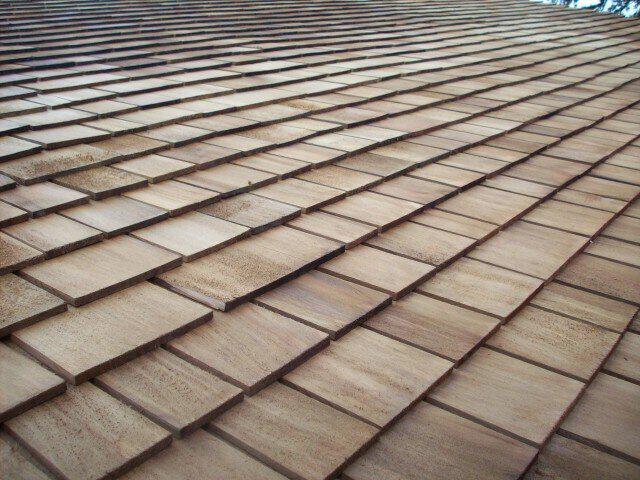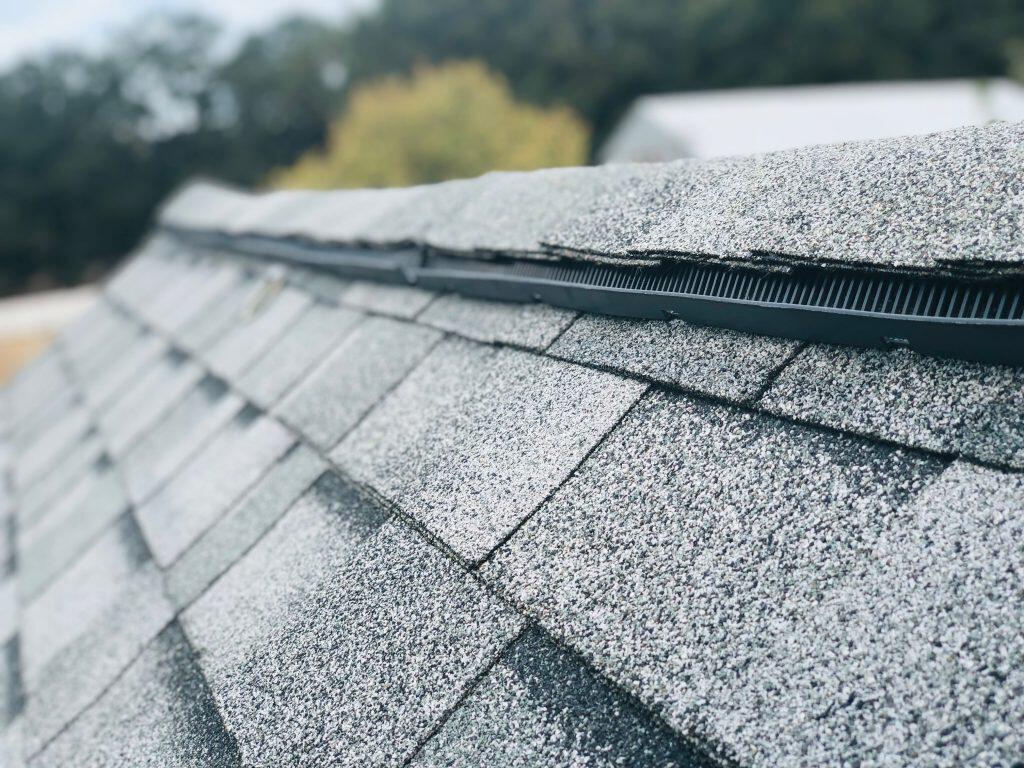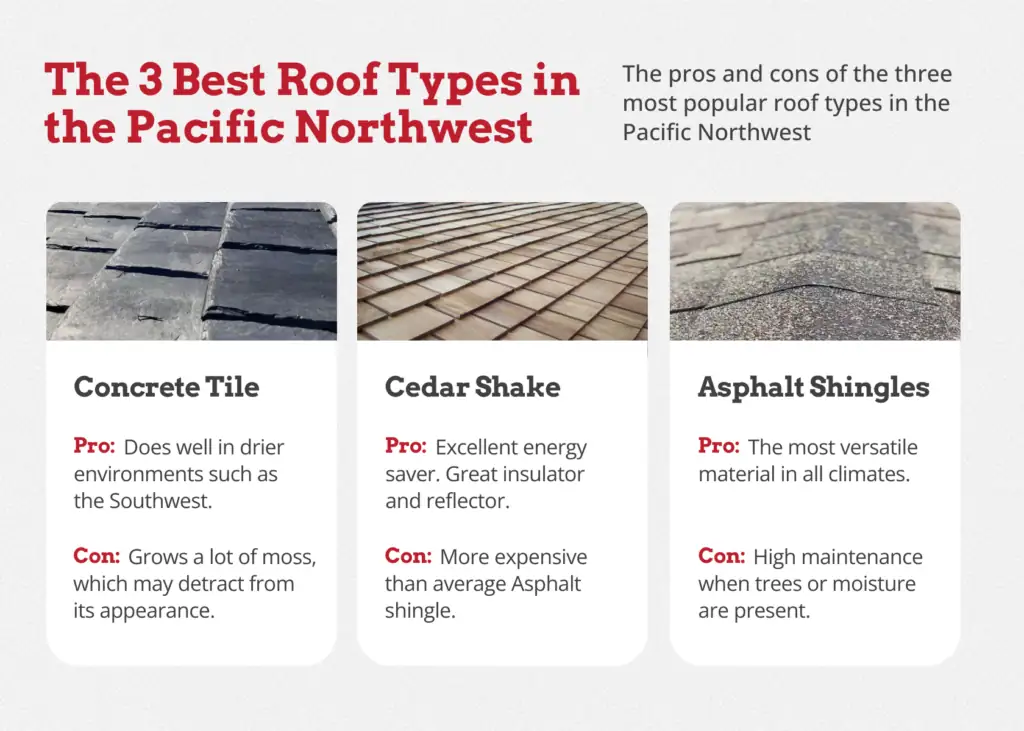We here at Roof Life have a deep appreciation for how roofs can complement the overall aesthetic of your home. This is why we work to ensure that all roofs under the Roof Life umbrella are well maintained and made to last. With that being said, not every roof is created equal. Like most things, certain pros and cons must be weighed, especially when it comes to replacing your existing roof and looking at options available for its replacement. In this article, we are here to examine the pros and cons of the three most popular roof types in the Pacific Northwest: Tile, Cedar Shake, and Asphalt Shingles.
Concrete Tile Roofs
Aside from Asphalt shingles, Tile roofs are the most commonly used materials for roofing in the United States. It is made from Portland cement that is capable of withstanding a variety of weather extremes, and has been on the market a very long time and has proven itself to be a very durable roofing product, especially severe storms.
Another characteristic is its weight. Tiles in themselves weigh roughly 9 ½ lbs to 12 lbs per square foot. The substructure of the building needs to be engineered to handle the weight of the tile and the moisture that it holds as it ages.
In terms of cost, it is near the top end of all roofing materials. Combine that with structural enhancements needed for the weight it can be quite spendy. A fair warning on attempts to use a lightweight cement tile would be prudent as all attempts have failed due to breakage and inability to maintain them in a standard procedure. We suggest sticking with the traditional heavy tile for long term roofing on your home.
In terms of weather, tiles are best suited to handle arid and hot environments. While the tiled roofs can withstand rain and humidity, the gaps found in most tiled roofs can become ideal incubation spots for moss growth. In retrospect, with regular maintenance from a trusted and experienced roofing company, all relevant tile roof problems can be mitigated.
With over 37 years of roofing experience in the Portland area, we know and have seen a thing or two. Feel free to give us a call to learn more about what we can do!
To better illustrate and condense the pros and cons, here is a spreadsheet to help you evaluate the variables that come with tiled roofing.
| Variables | Pros | Cons |
| Climate | Does well in drier environments such as the Southwest | This roof grows a lot of moss. Which detracts from its appearance. |
| Style of Home | Tile Roofs go well with most homes. Gives a rustic appearance. | May not do well with sharp primary-colored homes (Yellow, Red, Blue) |
| Color | Synthetic or Concrete Tiles offer more color variety | May raise your expenses. (Dependent on the quality and contractor) |
| Cost | Different tiers of tiles. Differing prices | $10 to $15 per square foot |
| Durability | Can last 50 years | If valleys and drip edges are installed correctly and the roof is treated to prevent moss growth there are no cons on the durability of this roof. |
| Energy Efficiency | up to a 48% reduction in heat transfer | No cons |
Many of the maintenance calls we receive here in Roof Life are due to prior contractors poorly setting the underlayment of the roof. This serves as a barrier that often catches residual debris from the environment. Provided that the Pacific Northwest experiences a lot of rain, many times run-off water is caught in the underlayment. After continued exposure to the rain, the integrity of the underlayment becomes compromised and creates leaks.
While tiled roofs are not ideal for a climate like the Pacific Northwest, this does not disqualify tiled roofs from being a great option for your home. However, careful consideration of all options available to you will go a long way. To reiterate, with proper and regular maintenance, your tile roof can last you many decades.
Get High-Quality Materials with Expert Installation
Roof Life of Oregon offers access to the best roofing materials for your home and climate. Our team can also install them with the utmost care and precision.
Cedar Shake Roofs

Cedar roofs, specifically Western Red cedar shakes, are the most popular version of wooden roofs. The material itself is timeless as this particular material has been used for over 300 years as a roofing material. Many will often find that the insulative properties and the general aesthetics are just a few of its attractions. This roofing material has the lowest carbon footprint among all other roofing options and is harvested from deadfall trees that are 400-600 years old. Furthermore, the cedar wood acts as a combatant to bacteria and fungi growth. It is recommended that all shakes installed in the NW be pre-treated, 100% vertical grain in quality and be installed on a high quality saturated felt underlayment. These shakes need to be installed with stainless steel fasteners. All that is required for maintenance of this roofing is to keep tree debris blown off on an annual basis and treated after 10 years of service. Minimal repairs will be needed due to the grain quality and the pre-treatment of the shakes. For Portland, this type of roofing has the lowest maintenance cost of all roofing materials. Depending on the thickness of the shakes homeowners can expect 30-50 years of service life.
Here is a breakdown of the variables presented in cedar shake tiles and their pros and cons.
| Variables | Pros | Cons |
| Climate | Perfect for the Pacific Northwest and other areas of high moisture and trees. | No Cons |
| Style of Home | Compliments the look of most homes very well | No Cons |
| Color | Aesthetic wood finish. Weathers into a greyish color. | Not very many color options |
| Cost | $12-$15 per square foot | More expensive than average Asphalt shingle |
| Durability | Durable for up to 50 years | Durability is dependent on regular maintenance and conditions |
| Energy Efficiency | Excellent energy saver. Great insulator and reflector | No Con |
While cedar shake roofs are steadily becoming replaced with newer grade asphalt shingles, because of the low grade shakes that were installed on high-end homes requiring homeowners to do a lot of maintenance repairs and treatment. This is an exact opposite experience you will have with a pre-treated high-grade shake roof installed correctly by Roof Life of Oregon. Understanding this, Roof Life is well educated, experienced and equipped to deal with any and all of your cedar shake roof needs.
Asphalt Shingles

The most popular roofing type, the asphalt shingle’s versatility is well known and recognized by homeowners throughout the United States. Most asphalt shingles are created with a fiberglass mat, a layer of asphalt and a layer of granules. This manufacturing process has hot asphalt sprayed onto a fiberglass mat, and while still hot, granules are applied into the asphalt, and as it is pressed rolled and cooled, it bonds together. They have a good fire rating and withstand a variety of weather extremes. It is perfectly suitable for all climates.
This physical makeup of an asphalt shingle is why some do it yourself processes cause it to prematurely fail. For example, laundry detergent was widely used for the phosphates as it changed the PH of the roof but was quickly removed from the market as it has been proven to be toxic to our environment. In order for laundry detergent to clean clothes without phosphates, they added a degreaser. This degreaser reacts negatively with the asphalt base of your shingles by melting it, causing it to release all the granules. This would be called the premature replacement of the roof. The other idea of controlling moss on asphalt roofs was to use zinc sulfate or hydrate. Both of these products are deadly to existing moss growth and, unfortunately, everything downstream. It is not a viable solution for long term control of growth on the roofs when all costs of our environment are considered. Roof Life of Oregon only uses green moss control products. They are effective in controlling moss on your roof, and they don’t kill everything downstream.
Here are a few variables to keep in mind, along with their respective pros and cons.
| Variables | Pros | Cons |
| Climate | The most versatile material in all climates | High maintenance required in trees, high moisture areas. |
| Style of Home | Works well with most, if not all homes. | Doesn’t look great on older, rustic homes |
| Color | Variety of color options | Discontinued colors |
| Cost | Upfront lowest cost | Not the lowest cost per day use |
| Durability | Adequate Durability with proper maintenance | Replace every 20-25 years |
| Energy Efficiency | Not energy efficient | Not eco-friendly |
Asphalt shingle’s notable use throughout the United States is a result of its variety in color options, types, and general affordability. As mentioned previously, there are many freelancers and roofing companies who are not aware of the care that goes into installing these shingles.
With improper installation, run-off stormwater can channel into and against areas of your roof that are susceptible to leaks. Many times, our team is called to mitigate the issues left unintended, ignored, or haphazardly solved. These minor details going unaddressed have led many distressed homeowners with leaks, shingle displacements, and more.
*With over 37 years of experience, specializations in all manner of roofing materials, and customer satisfaction to prove it, we are more than willing to accommodate your needs.*

Deciding Factors
To recap, observing the environment around you is a key component in determining what type of roof is best for you. After getting an idea of your surroundings and the weather, weighing the aesthetic options for every roof type is recommended.
Tiled roofs are best suited for arid and dry environments. While there are not as many color options and can drive up your costs, you’re paying for longevity and durability.
Cedar Shake roofs are eco-friendly and aesthetic. With a look that will compliment just about any home and its relative affordability, it is a good option for many homeowners. While you are susceptible to repairs and regular maintenance, this option is great for those looking for a natural look to their home.
Asphalt shingles are the most widely used on all fronts. When comparing it to the other materials, it is arguably the most affordable. It is often accompanied by a range of aesthetic options, from granular material to color. While not as durable as other roofing materials, it serves as the perfect middle ground and can last you many years when properly cared for.
Whether it is roof replacement, roof maintenance, leaks, repair response, and of course, moss control, Roof Life of Oregon has you covered.
Areas We Serve
Roof Life of Oregon provides a full suite of roofing services to the following cities in the Portland Metro:
